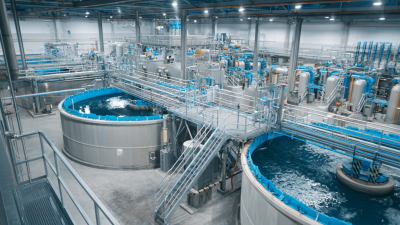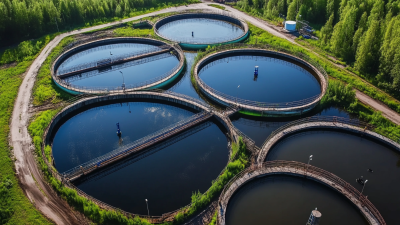The Wastewater Treatment Industry is undergoing a transformative phase, propelled by the advent of innovative technologies that promise to enhance efficiency, reduce costs, and improve environmental outcomes. According to a report by Grand View Research, the global wastewater treatment market was valued at approximately $330 billion in 2021 and is expected to grow significantly, driven by increasing population and stringent environmental regulations. With a growing emphasis on sustainable practices, new advancements such as membrane bioreactors, advanced oxidation processes, and IoT-based monitoring systems are revolutionizing how wastewater is managed. These technologies not only ensure compliance with regulatory standards but also enable the recycling and recovery of resources, such as water and nutrients, thereby fostering a circular economy. This blog aims to provide a comprehensive overview of the various innovative technologies shaping the future of the Wastewater Treatment Industry and their associated benefits.

Emerging membrane technologies are revolutionizing the wastewater treatment industry by enhancing efficiency and environmental sustainability. Recent studies indicate that membrane technology not only provides cost-effective solutions but also contributes to energy savings and improved pollutant removal. For instance, thin-film nanocomposite (TFN) membranes have demonstrated exceptional performance in removing emerging contaminants from wastewater, showcasing their potential for addressing complex pollution challenges. The integration of nanoparticles within the polyamide structure enhances selectivity and permeability, which is crucial for dealing with pharmaceuticals and other hazardous substances commonly found in wastewater.
Furthermore, advancements in ceramic membrane technology are proving vital in diverse applications, including textile wastewater treatment. Research indicates that ceramic membranes exhibit enhanced durability and resistance to fouling compared to traditional materials, leading to longer operational lifespans and lower maintenance costs. Moreover, integrating artificial intelligence modeling with membrane technologies is opening new avenues for optimizing treatment processes, enabling better management of wastewater treatment facilities. This synergy not only boosts operational efficiency but also paves the way for smart and sustainable wastewater management solutions.
Innovative biochemical processes are revolutionizing wastewater management by enhancing treatment efficiency and sustainability. Traditional methods often relied heavily on physical and chemical approaches, which, while effective, can incur high operational costs and generate secondary pollutants. The advent of advanced biochemical techniques, such as anaerobic digestion and membrane bioreactors, has introduced more eco-friendly alternatives that not only improve the quality of treated water but also allow for resource recovery, such as biogas production and nutrient reclamation.
One notable innovation is the application of microbial fuel cells (MFCs) in wastewater treatment. MFCs harness the natural metabolic processes of bacteria to convert organic matter in wastewater into electricity, effectively addressing both energy and waste management challenges. This dual functionality exemplifies the potential of integrating biochemical processes into wastewater treatment infrastructures. As regulatory pressures and public awareness of environmental issues rise, the adoption of these innovative technologies will undoubtedly play a crucial role in shaping sustainable wastewater solutions for the future.
The incorporation of artificial intelligence (AI) into the wastewater treatment industry is revolutionizing traditional methods, driving efficiency and effectiveness in the process. AI technologies leverage vast amounts of data collected from treatment facilities to enhance decision-making and optimize operations.
Through predictive analytics, AI can forecast equipment failures and maintenance needs, allowing for proactive measures that minimize downtime and extend the lifespan of critical infrastructure. This smart approach not only preserves resources but also reduces operational costs, making wastewater treatment both environmentally and economically sustainable.
Moreover, machine learning algorithms are employed to improve process control and monitoring. By analyzing real-time data from sensors, AI systems can adjust treatment parameters dynamically, ensuring that water quality standards are consistently met.
This level of automation reduces the risk of human error and enhances the ability to respond swiftly to unexpected changes in water composition. With the growing emphasis on sustainable practices, integrating AI into wastewater treatment demonstrates a commitment to innovation that aligns with environmental stewardship and regulatory compliance, paving the way for a smarter, cleaner future in water management.
The wastewater treatment industry is witnessing a paradigm shift towards innovative technologies focused on sustainable energy recovery. Among these, microbial fuel cells (MFCs) have emerged as a promising solution, capable of simultaneously treating wastewater and generating clean electricity. Recent advancements in MFC technology, including the optimization of anode materials, have significantly enhanced biofilm formation and electron transfer efficiency, unlocking the potential for renewable energy generation from wastewater. According to current research, optimizing these systems could lead to increased efficiencies, making MFCs an attractive prospect for achieving global renewable energy targets.
In addition, heat recovery from wastewater is gaining traction as a method to bolster energy sustainability within treatment processes. A comprehensive review indicates that wastewater heat recovery systems can efficiently harness thermal energy at various scales, thus reducing dependency on conventional energy sources. The integration of these technologies not only facilitates a transition towards 100% renewable wastewater treatment plants but also aligns with broader goals of carbon neutrality and eco-friendly resource management. As industries increasingly adopt these innovative technologies, the nexus of water, energy, and food security becomes crucial in guiding the selection of optimal energy recovery solutions.
The wastewater treatment industry is undergoing a significant transformation, driven by advanced monitoring and control technologies. These innovations are not only enhancing operational efficiency but also ensuring that treatment processes are more sustainable and effective. Technologies such as real-time data analytics, IoT sensors, and automated control systems are enabling facilities to optimize their treatment processes, reduce energy consumption, and improve overall water quality. With the growing emphasis on environmental sustainability, these advancements are crucial for meeting regulatory standards and public expectations.
Moreover, the integration of artificial intelligence and machine learning into wastewater treatment systems is revolutionizing the industry. These technologies allow for predictive maintenance and operational adjustments based on real-time data, helping facilities respond proactively to changing conditions. By analyzing vast amounts of data, AI can identify patterns and anomalies, reducing downtime and enhancing productivity. As we move towards a more advanced and sustainable future, the role of these innovative technologies in wastewater treatment will be vital for achieving operational excellence and fostering a circular economy.






